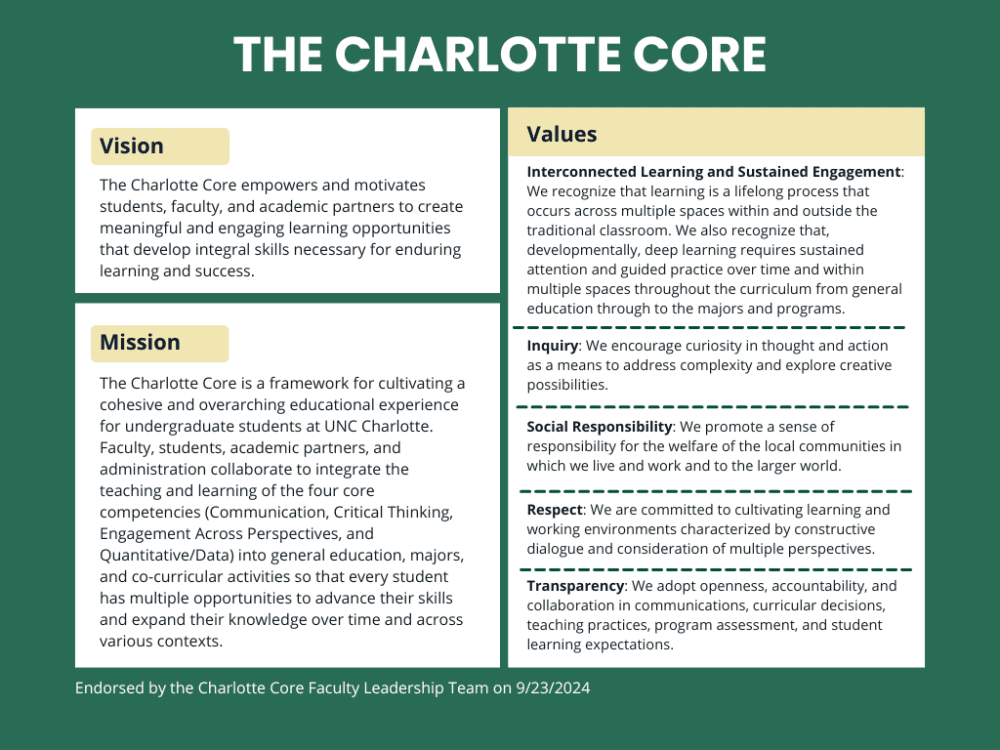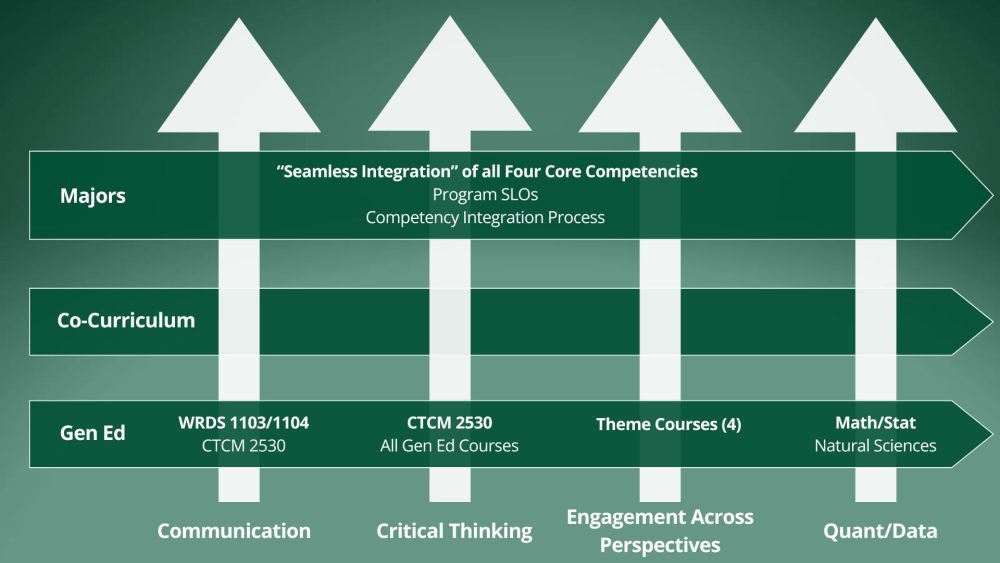Charlotte Core
Preparing students for success in college, work, and life!
The Charlotte Core provides our undergraduate students with an overarching and interconnected learning experience by intentionally integrating the four competencies, Communication, Critical Thinking, Engagement Across Perspectives, and Quantitative/Data, into and across general education, the majors, and co-curricular activities.
The Charlotte Core is an exciting opportunity for students, faculty, and staff. It allows students to develop the four core competencies throughout their time at Charlotte. It allows faculty and staff to contribute meaningfully to pedagogical and curricular excellence at Charlotte. Explore the many opportunities we have for faculty and staff involvement!

The Charlotte Core student experience
The Charlotte Core breaks through barriers so that students experience their education at UNC Charlotte as connected and meaningful.
The four competencies form connections between general education courses, major courses, and co-curricular activities with general education providing the foundation on which the majors and co-curriculum build.

The Four Core Competencies
Charlotte’s four core competencies are highly valued, durable, and transferable. They prepare our students to be successful college graduates, versatile career professionals, and engaged citizens and community members.
Communication
Communication competence focuses on how people create, use, and interpret messages to generate meanings within and across various contexts. Students need to be prepared to communicate intentionally in multiple modes including speech, writing, and visuals. The general education program works to provide a basis in rhetorical concepts and the inquiry process with an emphasis on written communication. Majors are encouraged to build on this basis by integrating professional and disciplinary communication skills into their student learning outcomes that represent multiple modes.
Student Learning Outcomes
- Compose writing projects appropriate to the audience, purpose, message, and context
Critical Thinking
Critical Thinking competence involves identifying and analyzing problems, evidence, and solutions. Students need to be prepared to think critically by analyzing existing complex issues, making reasoned judgements, and generating their own problem-based inquiries.
Student Learning Outcomes
- Formulate questions/problem statements/theses/hypotheses/etc. designed to address issues as situated in their cultural, historical, and/or disciplinary contexts
- Evaluate issues by identifying claims, supporting evidence, and reasoning
- Use evidence to propose and support conclusions
Engagement Across Perspectives
Engagement Across Perspectives competence is a lifelong process that involves knowledge/awareness, skills, and dispositions/attitudes. Students who have this competence can work and interact respectfully and effectively with people with a variety of cultural backgrounds and identities, from the classroom to the world.
Student Learning Outcomes
- Ask questions about familiar and unfamiliar communities and/or cultures
- Discuss cultural similarities and differences in perspectives, behaviors, expressions, and/or communication styles across space and/or time
- Interpret events, issues, problems, topic, etc. from multiple perspectives
Quantitative/Data
Quantitative / Data competence focuses on how people gain literacy, competency, and confidence in the analysis, manipulation, and interpretation of quantitative information and data. Students will identify supporting evidence from data-driven quantitative sources to justify or refute arguments. They should be able to clearly communicate this evidence and their results in a variety of formats.
Student Learning Outcomes
- Determine the quantitative analysis and data needed to solve problems or answer questions
- Use quantitative and/or statistical techniques to solve problems/answer questions/analyze data
- Interpret the results of the quantitative and/or statistical analysis